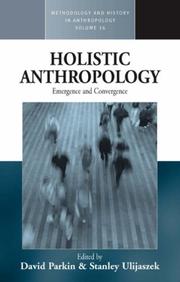| Listing 1 - 6 of 6 |
Sort by
|
Book
ISBN: 9782711740468 2711740463 Year: 2007 Publisher: Paris: Vuibert,
Abstract | Keywords | Export | Availability | Bookmark
 Loading...
Loading...Choose an application
- Reference Manager
- EndNote
- RefWorks (Direct export to RefWorks)
Le tout n'est-il que la somme de ses parties ou bénéficie-t-il de propriétés spécifiques ? Dans cette seconde hypothèse, comment comprendre l'émergence de ces nouvelles propriétés lorsqu'on passe d'un niveau d'organisation à un autre ? Les questions soulevées ici portent sur la relation d'une totalité (système, milieu, groupe, organisme, etc.) aux éléments qui la composent (individus, organes, molécules, etc.). Elles ne sont pas propres à une spécialité, mais parcourent des champs disciplinaires divers, de l'écologie à la biologie, de la statistique médicale à l'épidémiologie, de l'astrophysique à la chimie. La relation du tout aux parties peut même être pensée à l'intérieur de la théorie scientifique pour en étudier l'organisation hiérarchique. Au cœur des réflexions contemporaines en matière de philosophie des sciences, ces questions font ici l'objet d'études menées - sans verbiage ni hermétisme - par des philosophes et des scientifiques figurant parmi les meilleurs spécialistes français de ces différents domaines.
Whole and parts (Philosophy) --- Science --- Philosophy --- Science - Philosophy --- Biologie --- Systèmes biologiques
Book
ISBN: 1281346136 0191533106 9780191533105 1383041032 Year: 2007 Publisher: Oxford Clarendon
Abstract | Keywords | Export | Availability | Bookmark
 Loading...
Loading...Choose an application
- Reference Manager
- EndNote
- RefWorks (Direct export to RefWorks)
This work develops and defends a structural view of the nature of mathematics, and uses it to explain a number of striking features of mathematics that have puzzled philosophers for centuries.
Mathematics --- Structuralism. --- Constructive mathematics. --- Mathematics, Constructive --- Logic, Symbolic and mathematical --- Structure (Philosophy) --- Philosophy --- Whole and parts (Philosophy) --- Form (Philosophy) --- Poststructuralism --- Logic of mathematics --- Mathematics, Logic of --- Philosophy.

ISBN: 9781845453541 1845453549 Year: 2007 Volume: 16 Publisher: New York, N. Y. Berghahn Books
Abstract | Keywords | Export | Availability | Bookmark
 Loading...
Loading...Choose an application
- Reference Manager
- EndNote
- RefWorks (Direct export to RefWorks)
Philosophical anthropology --- Ethnology. Cultural anthropology --- Anthropology. --- Holism. --- Anthropologie --- Holisme --- #SBIB:39A3 --- Antropologie: geschiedenis, theorie, wetenschap (incl. grondleggers van de antropologie als wetenschap) --- Wholism --- Evolution --- Whole and parts (Philosophy) --- Human beings --- Anthropology --- Holism --- Primitive societies --- Social sciences
Book
Year: 2007 Publisher: Columbus : Ohio State University Press,
Abstract | Keywords | Export | Availability | Bookmark
 Loading...
Loading...Choose an application
- Reference Manager
- EndNote
- RefWorks (Direct export to RefWorks)
Imperialism in literature. --- Social institutions in literature. --- Literature and society --- Whole and parts (Philosophy) in literature. --- Identity (Philosophical concept) in literature. --- National characteristics, English, in literature. --- English fiction --- History --- History and criticism.
Book
Year: 2007 Publisher: Columbus : Ohio State University Press,
Abstract | Keywords | Export | Availability | Bookmark
 Loading...
Loading...Choose an application
- Reference Manager
- EndNote
- RefWorks (Direct export to RefWorks)
Imperialism in literature. --- Social institutions in literature. --- Literature and society --- Whole and parts (Philosophy) in literature. --- Identity (Philosophical concept) in literature. --- National characteristics, English, in literature. --- English fiction --- History --- History and criticism.
Book
ISBN: 9781847792266 184779226X 9781781701522 1781701520 9780719071287 Year: 2007 Publisher: Manchester Manchester University Press
Abstract | Keywords | Export | Availability | Bookmark
 Loading...
Loading...Choose an application
- Reference Manager
- EndNote
- RefWorks (Direct export to RefWorks)
Unstable universalities examines the theme of universality and its place in radical political theory. Saul Newman argues that both Marxist politics of class struggle and the postmodern politics of difference have reached their historical and political limits, and that what is needed is a new approach to universality, a new way of thinking about collective politics. By exploring various themes and ideas within poststructuralist and post-Marxist theory, the book develops a new and original approach to universality - one that has important implications for politics today, particularly on question
Radicalism. --- Collectivism. --- Poststructuralism. --- Universals (Philosophy) --- Universals (Logic) --- Knowledge, Theory of --- Logic --- Philosophy --- Scholasticism --- Whole and parts (Philosophy) --- Post-structuralism --- Philosophy, Modern --- Structuralism --- Totalitarianism --- Extremism, Political --- Ideological extremism --- Political extremism --- Political science --- Marxist-Leninism. --- class struggle. --- globalisation. --- neo-liberal capitalism. --- postmodernity. --- power. --- radical politics. --- religious fundamentalism. --- universality. --- war on terror.
| Listing 1 - 6 of 6 |
Sort by
|

 Search
Search Feedback
Feedback About UniCat
About UniCat  Help
Help News
News